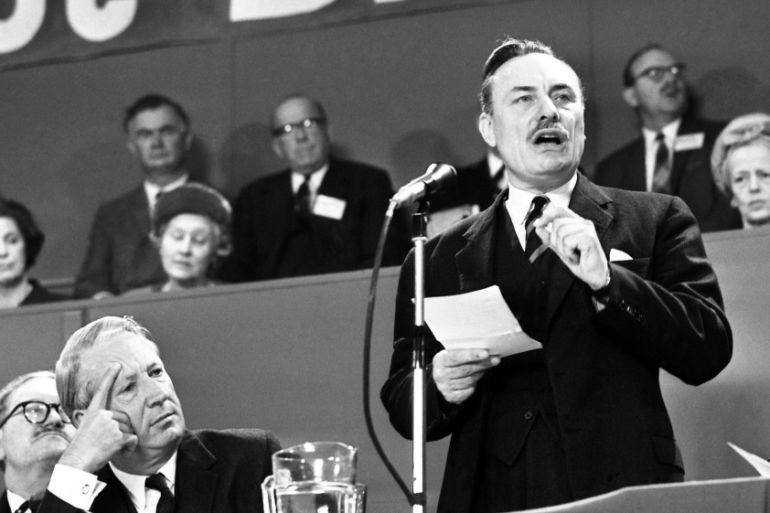The concerning popularity of Enoch Powell and his racist speech
There have been no “rivers of blood” in Britain, but Enoch Powell and his racist thinking still find acceptance.

It has been 50 years since British shadow defence secretary Enoch Powell gave his “rivers of blood” speech on April 20, 1968. To mark the half-centenary, the BBC broadcast his speech for the first time in full, on the radio.
The decision caused outrage from those who would rather the speech, and its popularity at the time, was forgotten.
Keep reading
list of 4 itemsBiden labels Japan and India ‘xenophobic’ along with China and Russia
After deadly attack, Russia’s Central Asian workers report rising racism
‘Feel less and less like playing’: Vinicius Jr in tears over racist abuse
Some 74 percent of Britons in the aftermath of Powell’s rhetoric agreed with him – that black immigration was likely to cause violence on our streets in the not too distant future, or as he put it – “In this country in 15 or 20 years’ time the black man will have the whip hand over the white man.”
A few days later, a group of white youths descended on the christening party of a Caribbean family, slashing the face of the baby’s grandfather. They chanted “Powell” and “Why don’t you go back to your own country!
Fifty years later, the UK finds itself amid another immigration scandal in which the children of Caribbean labourers invited to help rebuild the British economy after World War II are threatened with deportation. Has Britain really changed in this half a century?
Support for Powell from the left and right
Although lauded at the time for speaking the truths of the common man, Powell was also accused of inventing some of the anecdotes he used in his speeches.
Journalist Clem Jones, editor of a prominent evening newspaper, was first to notice the trend when he researched a white constituent who had allegedly complained to Powell about being the only white person on her street. Powell had used the white constituent as an anecdote in his speech.
Jones sent journalists to find this woman. They searched the electoral register and knocked on doors.
Jones eventually concluded that the woman Powell used to legitimise his views simply did not exist. A similar story had emerged when Jones looked into another anti-immigration speech Powell gave some weeks earlier in a nearby town, Walsall. It was established that similar complaints were being sent by far-right National Front members.
Likewise, MI5 later investigated a march of 500 dockers supporting Powell through London and discovered that it too had been orchestrated by fascists.
Powell’s symbiotic relationship with the far right cannot account for all of the support he received though. It does not explain why left-wing trade unions also came out in his support, or how the left-wing Labour government then introduced the Commonwealth Immigrants Act, ending a welcome period for members of former colonies. What Powell was saying clearly resonated with millions, if not tens of millions.
Unexpected public figures leapt to his defence. Eric Clapton, the famed guitarist, expressed support for Powell on stage in 1976 and asked “foreigners” to leave.
The staunch socialist leader of the Labour Party, Michael Foot, called him an “outstanding personality” and described his sacking as “tragic.” Powell had proposed a “ministry of repatriation” to co-ordinate “voluntary repatriations,” although the idea never got implemented.
In July 1969, the Guardian was critical of Powell’s tone and “spurious statistics,” but nevertheless asked, “could the unfortunate concentration of coloured communities in a few areas of the country be altered more by voluntary repatriation than by a practical policy of dispersal?”
What Powell had tapped into was a reservoir of discontent felt by the public about high levels of immigration. What he decided to do, rather than calm fears, was incite people to violence.
Powell’s persistent popularity
Powell was no prophet. There were no rivers of blood, despite immigration to Britain continuing. There was, however, Brexit, secured partly thanks to a rigorous anti-immigration campaign.
There have also been outrageous immigration policies that Powell would have approved of, including a nastily named “hostile environment” policy towards migrants ordered by Theresa May, which have led, among other things, to the Windrush scandal currently rocking British society.
This scandal came as no surprise. There remains a deeply concerning and open strain of Powell revivalism on the British right.
In 2012, senior Conservative minister Iain Duncan Smith wrote a foreword to a new collection of essays that mixed very mild scolding with admiration of Powell. He called the “rivers of blood” speech “injudicious use of inflammatory language” and claimed that Powell was not racist. Young Conservatives, too, are palpably, albeit privately, obsessed with how “Powell was right” should no longer be a slogan for the far right alone.
Half a century has passed since Britain heard Powell’s words – and one question remains: He wasn’t right, so why did both the Conservatives and Labour seem to agree with him?
The views expressed in this article are the author’s own and do not necessarily reflect Al Jazeera’s editorial stance.
